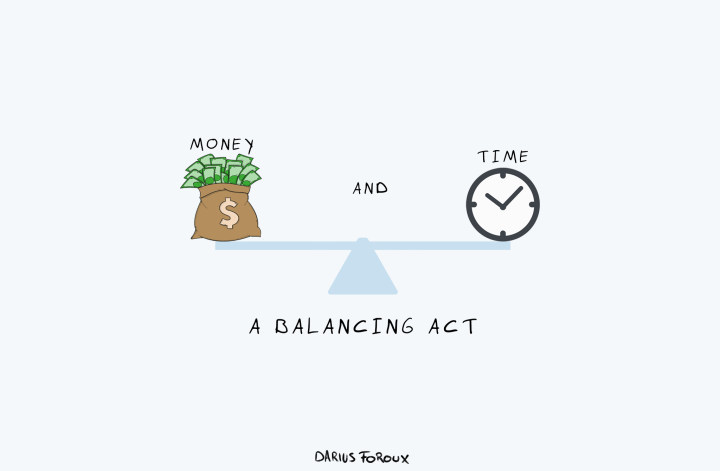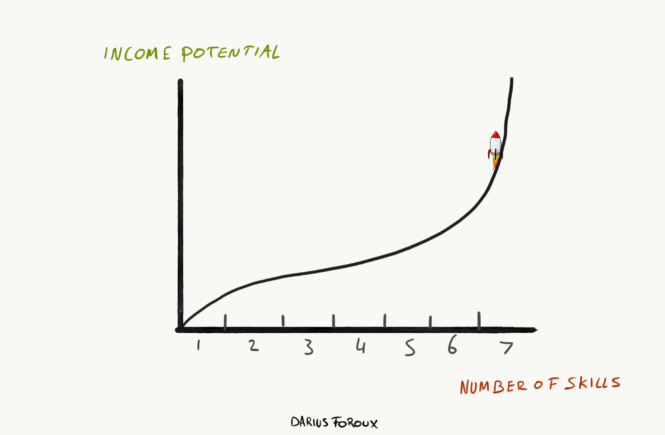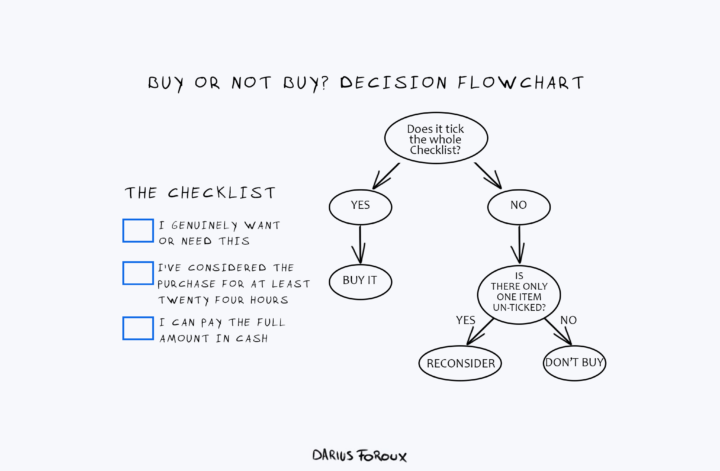Do you have “enough” money? A study found that the ideal income for a typical American family to have “emotional well-being” is around $60,000 to $75,000 annually.1Source: Nature Journal of Human Behaviour
In an interview, Warren Buffett said he would be “very happy” with $100,000 a year, despite his billionaire net worth.2Source: CNBC Meanwhile, John Bogle, the pioneer of modern index investing and founder of the Vanguard Index Fund, says “enough” is “one dollar more than you need.” Which I think is also a good definition.
The truth is that “enough” depends on our personal circumstances.
Money is an emotional subject, not a rational one. A multi-six-figure earner can feel they’re overwhelmed with material desires. While someone earning a fraction of that can feel perfectly satisfied with their life.
It’s all about what we think we need.
Here’s a thought experiment for you: Categorize all your needs.
That will help you to improve your relationship with money. There are several ways you can do this. Here’s an example:
- Security — Having an emergency fund, a nest egg, and being financially free.
- Loved ones — After establishing one’s own financial freedom, some people choose to take financial obligations for their family, sometimes including those in their extended family.
- Exploration — traveling to other countries, having new experiences, living a non-traditional lifestyle, and so forth.
- Hobbies — Cycling, training for endurance sports, collecting sports cars/luxury watches/ “big person” toys, beauty and fashion, etc. Depending on a person’s immersion in the hobby, these things can cost thousands or millions!
- Creative outlet — painting, writing a book, making music, etc. Sometimes, your creative outlet is your full-time career. Other times, it’s a purely artistic endeavor that generates little to no income. Both are fine, depending on you.
You can define these categories any way you like. Then, ask yourself: What are my Top 2 needs?
The reason for choosing only two is that it forces you to think about whether you really want something over another. For most of us, security is always among the top 2.
But that may not be the case for others. Some people come from backgrounds that are financially well-off, for example. Or even if they don’t, they’d rather spend their time exploring and being fully immersed in their creative outlets. So security may not be a priority.
Also, focusing on only 2 primary needs prevents you from chasing money indefinitely.
This ensures you don’t become another John D. Rockefeller, once the owner of 90% of the oil and gas industry, whose definition of “enough” was “just a little bit more.”
How to get your other needs
My top 2 needs are Security and Family. I know that because after I managed to afford both, I realized I didn’t have a strong desire to change my lifestyle.
I asked myself: What would I do if I were rich?
And the answer is the same: I’ll wake up, do my work, have some exercise, then spend the rest of my time with people I care about.
Without managing my emotions, I would chase after every shiny object that comes my way. There was a time when I really wanted to buy a sports car. But I realized I was doing it merely to gain validation from others.
Now, does that mean we should only pursue our top 2 needs? Not at all. You pursue and focus on achieving your two, primary needs. But you don’t need to forget about all the others.
With the right habits and routines, we can get almost everything we want.
- You can become financially independent
- Buy a new car
- Travel to different countries
- Write a book
- and so forth
But not all at the same time.
For example, you can prioritize being financially independent first. And if a book helps your career, you can allocate an hour or two each day to writing it. Then, over time, you travel to one country after another. Then buy a car and a house. These things can happen in a span of 5 to 10 years.
That’s certainly better than trying to do everything at the same time, only to burn out later. Rushing things always come at a steep price.
It’s a matter of prioritization. And being consistent each day.
Something more important than money
The thing about money is that we can’t always use it to solve our problems. Just think of those people who fall into depression after career burnout. Or those who become estranged from their loved ones because they’re too busy with work.
I think there are two universal currencies in this world: Money. And time.
We need both. And it’s always a balancing act between the two. I often return to Seneca’s On the Shortness of Life, to remind myself about being in the present. In his book, Seneca says:
“You squander time as if you drew from a full and abundant supply, though all the while that day which you bestow on some person or thing is perhaps your last.”
To me, the most successful people are those who can afford to buy what they need. And still have the time to do all the things they want.




